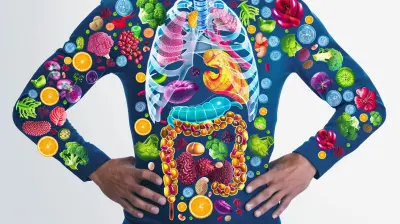The Relationship Between Genetics and Type 1 Diabetes
2 December 2024
Have you ever wondered why some people develop Type 1 Diabetes while others don't, even when their lifestyle choices seem almost identical? It’s not entirely about what you eat or how much you exercise. Instead, a significant piece of the puzzle lies in your DNA. Yep, genetics can often be the hidden string-puller when it comes to Type 1 Diabetes. So, let’s dive into the fascinating relationship between genetics and this autoimmune condition to understand it better.
What Is Type 1 Diabetes?
Before we get into the genetic connection, let’s talk about what Type 1 Diabetes actually is. Unlike Type 2 Diabetes, which is often linked to diet and lifestyle factors, Type 1 Diabetes is an autoimmune disease. Simply put, your immune system—which is supposed to protect your body—starts attacking the insulin-producing beta cells in your pancreas. Without enough insulin, your body can’t properly regulate blood sugar levels.Type 1 Diabetes can develop at any age, but it’s most commonly diagnosed in children, teenagers, or young adults. If you or someone you know is living with this condition, you know how much effort goes into balancing blood sugar levels, insulin doses, and daily life. It’s a lot, right?
The Role of Genetics in Type 1 Diabetes
Now comes the big question: What role does genetics play in causing Type 1 Diabetes? To put it simply, genetics sets the stage, but environmental factors might provide the final nudge. Think of it like a loaded gun—your genes load it, but something in your environment pulls the trigger.The HLA Region: Your Body's "Immune Map"
When it comes to genetics, the HLA (human leukocyte antigen) region is the star of the show. This region, located on chromosome 6, helps regulate your immune system. Think of it as your body's internal GPS, guiding the immune system to distinguish between "self" (your own cells) and "invaders" (like viruses or bacteria).In people with Type 1 Diabetes, specific HLA gene variations can increase the likelihood of the immune system making a mistake. Instead of fighting off infections, it starts attacking those poor, innocent beta cells in the pancreas. Imagine hiring a security guard to protect your house, only for them to destroy the furniture instead—this is what happens with autoimmune diseases.
Other Genes Linked to Type 1 Diabetes
The HLA region isn’t the only genetic player in town. Scientists have discovered over 40 different genetic markers associated with Type 1 Diabetes. Some of these include:- INS Gene: This gene influences how much insulin your body can produce. Variations in the INS gene can affect how the pancreas functions.
- PTPN22 Gene: This gene plays a role in immune system regulation. A specific variant here can make you more prone to autoimmune diseases, including Type 1 Diabetes.
- CTLA4 Gene: This gene helps keep the immune system in check so it doesn’t go overboard. Mutations in CTLA4 can disrupt this balance and increase the risk of autoimmunity.
Each of these genes contributes a little to the overall risk, but having one or more of these variations doesn’t guarantee you’ll develop Type 1 Diabetes. It’s a bit like having the ingredients for a cake—you still need someone to bake it, right?
Is Type 1 Diabetes Hereditary?
Okay, so let’s address one of the most common questions: Can you inherit Type 1 Diabetes from your parents? The answer is yes…but not in the way you might think.If you have a close family member with Type 1 Diabetes, your risk of developing the condition does increase, but it’s still relatively low. For example:
- If your mother has Type 1 Diabetes: You have about a 2-4% risk of developing it.
- If your father has it: The risk is slightly higher, around 6-9%.
- If you have a sibling with Type 1 Diabetes: Your chances are around 5-6%, but this can jump up to 30% if you’re an identical twin.
So, while the genetic link is there, it’s not a sure thing. Having a family history of Type 1 Diabetes means you might have the genes for it, but environmental triggers still play a crucial role.
Environmental Triggers: Pulling the Genetic Trigger
Here’s the kicker—not everyone with the "high-risk" genes develops Type 1 Diabetes. This is where environmental factors come in. Scientists believe that a combination of genetic predisposition and environmental triggers is what ultimately leads to the onset of the disease.Viral Infections
Certain viruses, like the Coxsackie virus or enteroviruses, have been linked to Type 1 Diabetes. The theory is that these viruses somehow confuse the immune system, leading it to attack the beta cells in the pancreas. It’s like your immune system gets its wires crossed during a fight with a virus and accidentally starts attacking your organs instead.Diet and Infant Feeding Practices
The role of diet in Type 1 Diabetes is still being studied, but some evidence suggests that early exposure to cow’s milk proteins or gluten might play a role in triggering the disease in genetically predisposed individuals. Breastfeeding, on the other hand, is thought to have a protective effect.Geography
Believe it or not, where you live can also influence your risk. Countries farther from the equator, like Finland and Sweden, have significantly higher rates of Type 1 Diabetes compared to places closer to the equator. Scientists speculate that this could be due to differences in sunlight exposure and Vitamin D levels, which might play a role in immunity.Genetic Testing: Should You Get Tested?
If you have a family history of Type 1 Diabetes, you might be wondering if genetic testing could help you predict whether you or your child will develop the condition. While genetic testing can identify some of the “high-risk” genes, it’s not a crystal ball.Remember, having the genes doesn’t guarantee you’ll get the disease—it just means your risk is higher than someone without those genetic markers. Genetic testing can be helpful if it’s combined with other risk assessments, like monitoring for autoantibodies (proteins that signal an autoimmune response).
Can We Prevent Type 1 Diabetes?
Unfortunately, there’s no known way to prevent Type 1 Diabetes, even if you’re genetically predisposed. Unlike Type 2 Diabetes, which can often be managed or prevented with lifestyle changes, Type 1 Diabetes doesn’t work that way.However, researchers are working tirelessly to uncover more about the disease. From early-stage clinical trials aimed at preserving beta cells to studies exploring how to train the immune system not to attack itself, there’s exciting progress on the horizon. Who knows? In the future, we might be able to use genetic insights to prevent or even cure Type 1 Diabetes.
Living With Type 1 Diabetes: It’s Not Your Fault
If you have Type 1 Diabetes or know someone who does, it’s crucial to remember this: It’s not your fault. You didn’t "cause" it by eating too much sugar or skipping workouts. Genetics and environmental factors—things completely out of your control—play the biggest roles.Managing Type 1 Diabetes can be challenging, yes, but with modern technology like continuous glucose monitors (CGMs) and insulin pumps, it’s becoming easier to lead a full, active life. And let’s not forget the incredible support from healthcare teams, friends, and family that makes all the difference.
Wrapping It Up
The relationship between genetics and Type 1 Diabetes is complex and fascinating. While genetics can raise your risk, they’re only one piece of the puzzle. Environmental triggers and other factors must align for the disease to develop.As science advances, we’re learning more every day about how to predict, manage, and perhaps even prevent Type 1 Diabetes. In the meantime, understanding these genetic connections can help us all feel a bit more empowered, whether we’re managing the condition ourselves or supporting someone who is.
all images in this post were generated using AI tools
Category:
DiabetesAuthor:

Madeline Howard
Discussion
rate this article
11 comments
Iliana Rocha
Insightful read—genetics shape our health!
April 6, 2025 at 4:21 AM

Madeline Howard
Thank you! I'm glad you found it insightful. Genetics indeed play a crucial role in understanding type 1 diabetes.
Sydney Baxter
Genetics play a crucial role here.
March 29, 2025 at 3:24 PM

Madeline Howard
Absolutely, genetics are key in understanding the predisposition to type 1 diabetes, influencing susceptibility and disease progression.
Charlie Turner
Understanding the interplay between genetics and Type 1 diabetes empowers us to embrace our journey. While genetics may play a role, remember that knowledge and support can inspire resilience. Together, we can foster a community of hope and innovation, driving towards better management and brighter futures for all. Keep pushing forward!
January 31, 2025 at 5:51 AM

Madeline Howard
Thank you for your insightful comment! I completely agree that understanding genetics, along with knowledge and community support, is vital in navigating Type 1 diabetes. Together, we can inspire resilience and drive positive change.
Verity McWhorter
Understanding the genetic factors behind Type 1 Diabetes empowers us to innovate prevention and treatment strategies. Together, we can transform challenges into breakthroughs for a healthier future!
January 23, 2025 at 3:55 PM

Madeline Howard
Thank you for your insightful comment! Understanding genetics is indeed crucial for advancing prevention and treatment strategies for Type 1 Diabetes. Together, we can drive meaningful progress in this field.
Trixie McGarvey
Great article! Understanding the genetic factors behind Type 1 Diabetes is essential for awareness and support. Your insights help demystify the condition and empower those affected. Keep up the fantastic work in spreading knowledge!
January 14, 2025 at 3:38 PM

Madeline Howard
Thank you for your kind words! I'm glad the article resonated with you and helped clarify the important genetic factors in Type 1 Diabetes. Your support means a lot!
Carla Rocha
Great insights! It's fascinating how our genes play a role in health. Thanks for sharing!
January 8, 2025 at 5:53 PM

Madeline Howard
Thank you! I'm glad you found it insightful. Genetics plays a crucial role in understanding type 1 diabetes.
Ivan Williams
This article effectively highlights how genetic factors contribute to Type 1 Diabetes, emphasizing the importance of ongoing research in this area.
January 6, 2025 at 3:30 AM

Madeline Howard
Thank you for your feedback! I'm glad you found the article informative and that it underscores the significance of genetic research in understanding Type 1 Diabetes.
Georgia Turner
This article offers a thoughtful exploration of how genetics influence the development of Type 1 diabetes. While genetic predisposition plays a significant role, environmental factors also contribute. Understanding this complex interplay is essential for advancing research and improving management strategies for those affected.
December 18, 2024 at 4:33 PM

Madeline Howard
Thank you for your insights! I agree that both genetics and environmental factors are crucial in understanding Type 1 diabetes and enhancing research and management approaches.
Skye McWain
Exciting insights! Understanding genetics can empower diabetes management!
December 6, 2024 at 5:35 PM

Madeline Howard
Thank you! Indeed, understanding genetics is crucial for improving diabetes management and personalized treatment strategies.
Patrick Lopez
Great insights! Understanding genetics can empower Type 1 diabetes management.
December 3, 2024 at 5:05 AM

Madeline Howard
Thank you! I'm glad you found the insights valuable. Understanding genetics is indeed crucial for better T1D management.
Dominic James
In the intricate dance of DNA and disease, Type 1 Diabetes emerges as a compelling enigma. Genetic whispers shape our fates, yet the full story remains cloaked in shadows. As researchers delve deeper, what secrets will they uncover about our inherited vulnerabilities and the unseen forces that trigger this condition?
December 2, 2024 at 4:30 AM

Madeline Howard
Thank you for your insightful comment! Indeed, the interplay of genetics and environmental factors in Type 1 Diabetes is complex, and ongoing research will hopefully illuminate these mysteries further.
MORE POSTS

How to Handle Food Cravings Healthily During Pregnancy

Healing After Birth: Essential Tips for Postpartum Recovery

Fall in Love With Tropical Flavors in These Smoothie Creations

Harnessing the Power of Mindful Visualization

The Importance of Warming Up Before Cardio Exercise

The Link Between Gut Health and Your Hormones

Navigating a Low-Carb Diet as an Endurance Athlete

The Link Between Gluten and Autoimmune Conditions